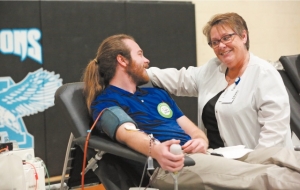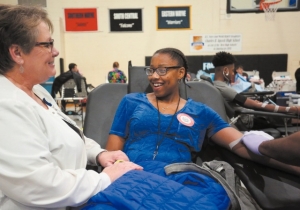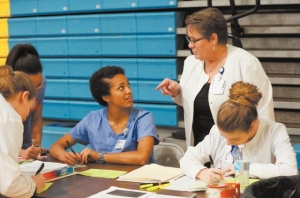Drive coordinator puts it in park
By Becky Barclay
Published in News on March 30, 2018 5:50 AM

News-Argus/CASEY MOZINGO
Faye Davis jokes with math teacher Jordan Williams as he donates blood Thursday in the gym at Charles B. Aycock High School. Davis, who will be retiring at the end of the semester, has been coordinating blood drives at the school for 18 years.

News-Argus/CASEY MOZINGO
Faye Davis comforts student Heaven Tatum, 16, who is donating blood for the second time, during one of Charles B. Aycock High School's blood drives Thursday in the gym.

News-Argus/CASEY MOZINGO
Health science educator Faye Davis gives instruction to Arlanda Faulkner at the check-in table during the Red Cross blood drive at Charles B. Aycock High School Thursday. Davis, who will be retiring at the end of the semester, has been coordinating blood drives at the school for 18 years.
In the past 18 years, Faye Davis has helped Charles B. Aycock High School collect thousands of units of blood.
The school's health science educator has been coordinating blood drives there for 18 years. But after the drive Thursday, she is hanging up her lab coat, retiring at the end of the school year.
Davis said she kind of fell into the position of blood drive coordinator when she came to the school as the health science educator.
"That was just part of what we did," she said. "I didn't have a clue how to do a blood drive when I first started here."
But have previously been a nurse for more than 20 years, with experience in administration, it started to come naturally to Davis.
"You learn, though, by doing," she said. "So we learned what worked. The reason that the blood drives work here is the students, they buy into them. These students are going to be our donors in the future, and if their first experience is a positive one, then they'll do it again. We have students who have graduated who still come back to the blood drives here because it's what they did."
Davis credits the success of the blood drives to her senior nursing fundamental students. She said not only do they learn a lot of the skills to be successful at the blood drives, but they also learn basic nurse aid skills, which also help them take care of the donors.
The students not only plan the blood drives, they man them, too.
"They set up a blood drive by asking the students here to sign up," Davis said. "They ask continuously because eventually the students will say yes.
"One of the things that has helped is my students will wear their scrubs the whole week they're signing up donors. When they are in their scrubs, I don't know what the difference in the mindset is, but the students take them more seriously."
During a blood drive, the nursing students sign in donors and take them to all of the stations they need to go to before they actually give blood. Then while the donors are giving blood, the nursing students will stand beside them to provide support. Lastly, they help the donor to the canteen and monitor them to make sure they are OK before leaving.
It's not just students who give blood, but also teachers and members of the community that the nursing students recruit to donate.
Davis said when the students plan and execute a blood drive, it gives them ownership -- and that's another reason the drives are so successful.
Normally, the goal for a blood drive at Aycock High School is between 140 and 160, Davis said.
"That is an exception to be able to collect that many units of blood," said Miranda Harrison, Red Cross senior account manager. "Especially at a high school. To get that many units of blood means they saw close to 200 students. Our records only go back to 2006, but in that time, Aycock has collected 3,924 units of blood.
"This is by far an exceptionally run blood drive. It's smooth and lot of it is because how Faye put so much time into it and pays close attention to detail, making sure it is a positive experience for the donors. Faye motivates her students in a way that I wish I could clone it."
Harrison said Davis and the students' focus is on the lives they are saving because for every donation, they're saving three patients' lives.
"That message has resonated with the students here at Aycock," she said. "This is the largest high school or community drive that I have in three counties."
Aycock used to have just two blood drives a year, but then a third one was added for the month of December, when supplies start to dwindle and the need can become critical, Harrison said.
"Faye was one of the first high schools to say yes to doing that third drive," she said. "Technology is changing, but there is no substitute for blood."
Davis may be leaving, but she'll always have her memories of the school blood drives over the years.
"Some of my best memories are when the donors are so nervous the very first time, and then they keep coming back. I hear donors who have given before sitting next to first-time donors telling them it's going to be OK."
